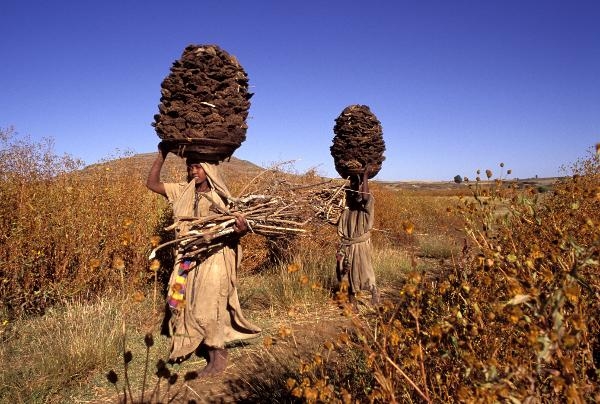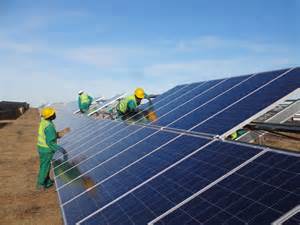By Miroslav Atanasov, Ph.D., Renmin University of China
At the World Hydropower Congress, which convened on May 9-11, 2017 in Addis Ababa, Ethiopia, Beijing had renewed its commitment to assist Africa's progress through increased investments in sustainable energy - a major catalyst to economic, social, and human development.
The electric sector is yet another example of the many paradoxes witnessed on the African continent. The lack of sufficient power infrastructure is a major hindrance to the development of the sub-Saharan region, which faces tremendous challenges with energy management and consumption.
More than 600 million Africans are without access to electricity and most families use traditional biomass for cooking fuel. Over 30 African countries experience power shortages resulting in major outages and over-reliance on quick temporary solutions that are both expensive and unfriendly to the environment.

According to the AU (African Union) Commission's report, if current trends continue less than half of African countries will achieve universal access to power by 2050.
There is an abundance of resources, however, that could be tapped to supply the continent with sufficient power. Africa is energy rich but power poor. According to a report from the European Commission's Energy Institute a mere 0.3 % of the sunlight in the Sahara Desert could produce enough electricity to meet all of Europe's needs.
Yet, solar energy had provided only a mere 1.5 gigawatts in Africa in 2015. The continent's great lakes and rivers offer immense hydropower potential, but less than 10 % of it is actually exploited.
Africa is also a major victim of climate change and its multiple effects. Even though it contributes only 4% of greenhouse gas emissions, it is the continent most affected, because it lacks the capacity to adapt. Recently persistent droughts have destroyed much farm produce and threatened the fragile food security in certain African regions.
Africa needs investment in clean energy to improve local quality of life and tackle climate change. Though there are obstacles, such as inadequate infrastructure and financing, Chinese companies are taking advantage of Africa's resource wealth to develop the sector, which holds a huge potential for growth.
Beijing's more active assistance began at the Forum On China-Africa Cooperation (FOCAC) summit in 2009, where then-Premier Wen Jiabao proposed Chinese financing for 100 clean energy projects in 11 African countries.
The projects have utilized some of the solar, biogas, and hydropower potential of the continent. African countries are learning from China's experiences to make better use of their resources and to develop clean energy from the start.
Beijing has also been funding the training of African nationals at Chinese universities in the field of power energy development. An educational exchange agreement for example, was signed in 2014 with South Africa, one of the world's clean energy hotspots.
In 2015, China proposed the Global Energy Interconnection (GEI) - an infrastructure platform for development, transmission, and mass distribution of clean energy, which attempts to meet global power demands with green alternatives.
During his presentation at the Congress in Addis Ababa last month, Liu Zhenya, Chairman of GEI underlined the need to partner with Africa through closer connectivity and common consent. Liu noted that African Energy Interconnection based on equality and mutual benefits is the key to a win-win collaboration.
Speaking at the opening of the Congress, Ethiopian Prime Minister Hailemariam Desalegn called for global cooperation on reliable and sustainable energy, which would lead to a positive transformation of African economies. Africa's per capita energy consumption cannot keep up with current economic growth.
So African countries should promote green technologies and use their natural resources to feed energy demands. China has positioned itself strategically as a key partner in this effort.
As a result of the recent meeting massive clean energy plans are underway whereby Chinese companies will invest hundreds of billions of USD in Africa's clean energy market. Li Xiande, Chairman of JinkoSolar, a major Chinese solar panel maker, proposed that Africa needs to add 1 to 1.5 GW of solar installations annually to keep up with their recent energy plans.

JinkoSolar has built solar plants in South Africa and is involved in projects in Morocco and Egypt as well. To attract more long-term investors, African nations should take further steps to improve the business climate and reduce risks.
Chinese involvement in Africa's energy sector is a priority in the context of south-south cooperation. China's long-term experiences and affordable technology are supported by the involvement of Exim Bank of China, which can finance big projects and help Chinese companies expand into the African market.
The Chinese solution to global clean energy connectivity has won widespread praise and positive responses from the international community. With the withdrawal of the United States from Paris Agreement, which was officially announced by President Donald Trump on June 1, China's global role in tackling climate change would become more prominent.
(The opinions expressed here do not necessarily reflect the opinions of Panview or CCTV.com)

Panview offers a new window of understanding the world as well as China through the views, opinions, and analysis of experts. We also welcome outside submissions, so feel free to send in your own editorials to "globalopinion@vip.cntv.cn" for consideration.















